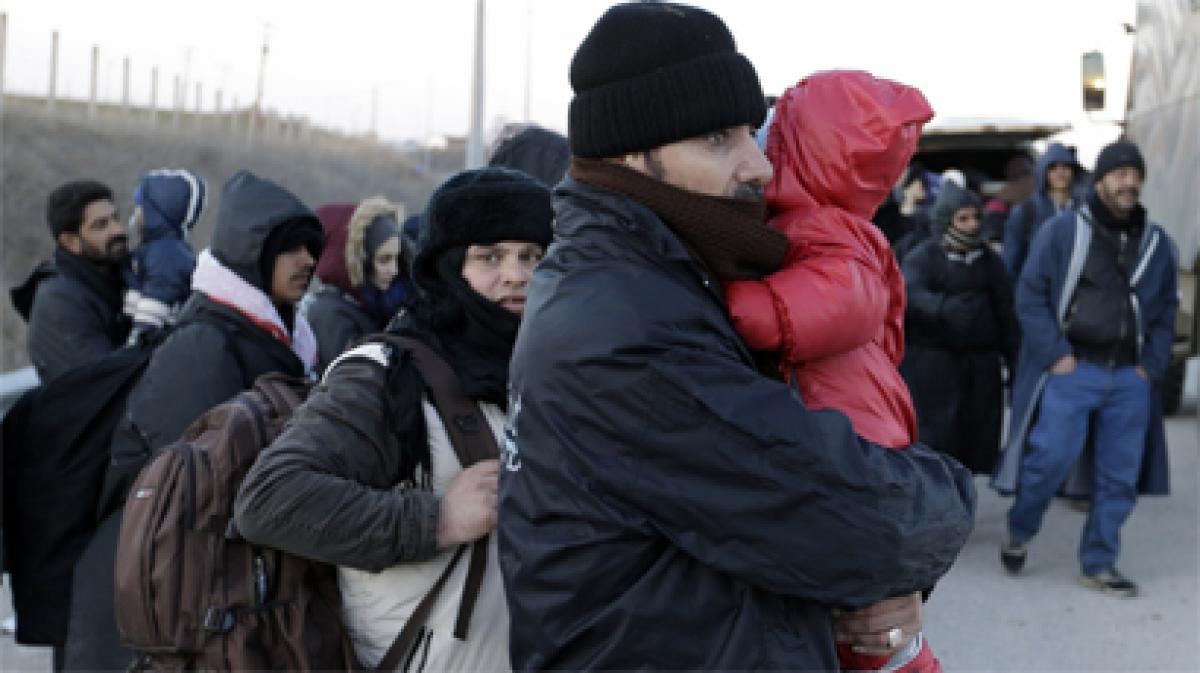Live
- K.T. Rama Rao calls on farmers arrested for attack on Vikarabad officials
- AP CM Chandrababu Naidu Unveils Vision for Andhra Pradesh amidst Financial Challenges
- VVS Laxman lauds fans for massive support on foreign tours
- Bengal lottery scam: Huge amount of cash traced, ED brings currency counting machine
- Raj Thackeray releases MNS election Manifesto with a ‘key’ to implementing it
- Gold prices likely to further come down with no near-term positive triggers
- Tough decision, but it's the right one: Southee on Test retirement
- After caste census, Dalits, tribals, poor will recognise their true strength: Rahul Gandhi
- Who was Birsa Munda, whose 'Ulgulan' declared the end of British rule in Jharkhand?
- Logistic firm Delhivery’s profit tanks over 80 pc in April-Sep period
Just In

Under fire over its handling of the EU\'s migration surge, Greece cannot hope to manage the influx unless Brussels and neighbouring Turkey keep their side of the bargain, experts say.
Under fire over its handling of the EU's migration surge, Greece cannot hope to manage the influx unless Brussels and neighbouring Turkey keep their side of the bargain, experts say.
The European Commission on Wednesday blasted Greece for "seriously" neglecting its border obligations and gave Athens three months to remedy the problem.
A damning EU report researched in November found insufficient registering and fingerprinting of migrants entering Greece from Turkey, the main gateway for refugees fleeing war in Syria, Iraq and Afghanistan.
This came after a succession of eastern EU states this week said Greece was failing to protect the exterior borders of Europe's passport-free Schengen zone, with some threatening to make Bulgaria and Macedonia the cutoff point if Athens is unable to staunch the inflow.
"If Greece and Turkey fail to protect the outer border and we are unable to cope with strong migrant pressure, we will have to discuss a plan B," Czech Prime Minister Bohuslav Sobotka said on Tuesday. Austria, Poland and Hungary have voiced similar criticism.
The pressure rose further with a senior Belgian official floating the idea of Greece being forced to host hundreds of thousands of migrants as punishment.
"The Greeks must suffer the consequences," Theo Francken, secretary of state for migration, told public broadcaster VRT.
"Hosting 200-300,000 people in camps on external borders is the sole possibility of halting the flow of refugees in the short-term."
Greece has reacted angrily to the criticism, with government spokeswoman Olga Gerovassili accusing EU partners of shifting blame instead of working together to end the continent's worst migration crisis since World War II.
"This tactic of diverting responsibility is not an effective response to a problem of historic dimensions, which requires joint action," she said Wednesday, pointing to Turkey as key in resolving the crisis.
'A game of bluff'
EU border agency Frontex this week acknowledged that the Aegean Sea, which claims the lives of migrants and their children almost on a daily basis, "is not a field that can be fenced."
"A game of bluff among EU states is now in the process of blowing up," says Henri Labayle, a law professor at the University of Pau, France.
Though Greece has long failed to meet its obligations, Labayle noted the "complete contradiction" of Athens being forced to axe state jobs under its economic bailout, and then being castigated for not having enough border staff.
In the last few months, Austria, Germany, Denmark, Sweden, France and non-EU member Norway have all introduced temporary controls over the migrant crisis, but with a limit of six months.
Philippe Leclerc, acting representative of the UN refugee agency in Greece, warns that border closures would have serious ramifications for debt-hit Greece.
"Over 2,000 people cross (from Greece into Macedonia) on a daily basis," he said.
"Should this procedure slow or stop altogether, it would have considerable repercussions on Greece."
Countries along the Balkan migrant route last year began restricting entry only to refugees from Syria, Afghanistan and Iraq.
And Macedonia last week began intermittently closing its Greek border, only allowing passage to refugees wishing to go to Germany or Austria.
Another change of policy on which nationalities to accept could leave tens of thousands requiring winter shelter, Leclerc adds.
"There is great fear (in Europe) and it leads to divisive and unilateral moves by nations," Yannis Mouzalas, Greece's junior migration minister, told Skai TV this week.
A former senior member of Doctors of the World, Mouzalas says screening centres known as hotspots would be fully operational on five Greek islands by early March.
"It's very difficult to build a hotspot when in the same hotspot every day you have 10,000 immigrants," he said.
He has insisted that despite the shortages, identification of migrants has been dutifully carried out for months, enabling Greek police to track the passage of at least two men who took part in November's jihadist attacks in Paris.
Mouzalas has repeatedly noted that Greece has received far less in staff and equipment than originally pledged by Europe.
"The Greeks in August wanted an additional 1,600 staff. Frontex promised 750, and 300 are currently available," says a European security source.
Turkey has taken little action to stop the activities of people smugglers on its coasts whilst also placing obstacles to repatriation of economic migrants.
"In recent days Turkey took back 123 migrants and sent over 60,000," Mouzalas told Skai TV on Wednesday.
"The Turks only take their own back... They refuse 98 percent of relocation demands," says the European security source.

© 2024 Hyderabad Media House Limited/The Hans India. All rights reserved. Powered by hocalwire.com







